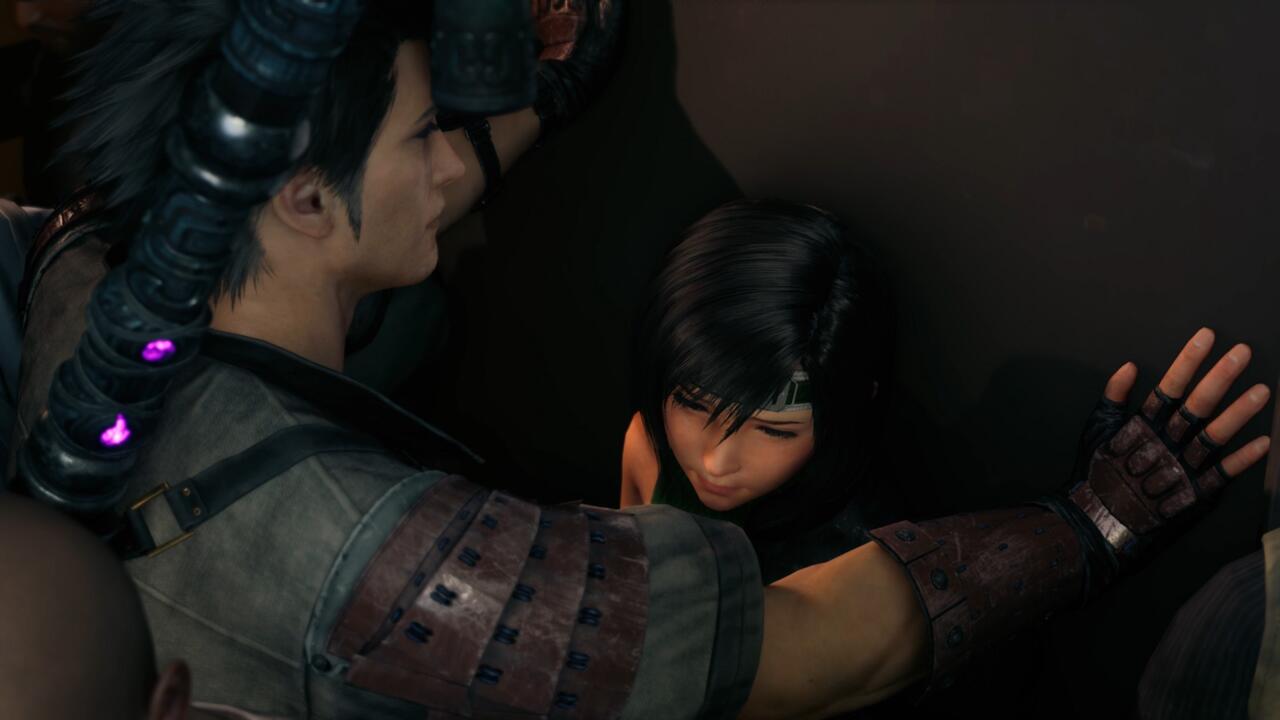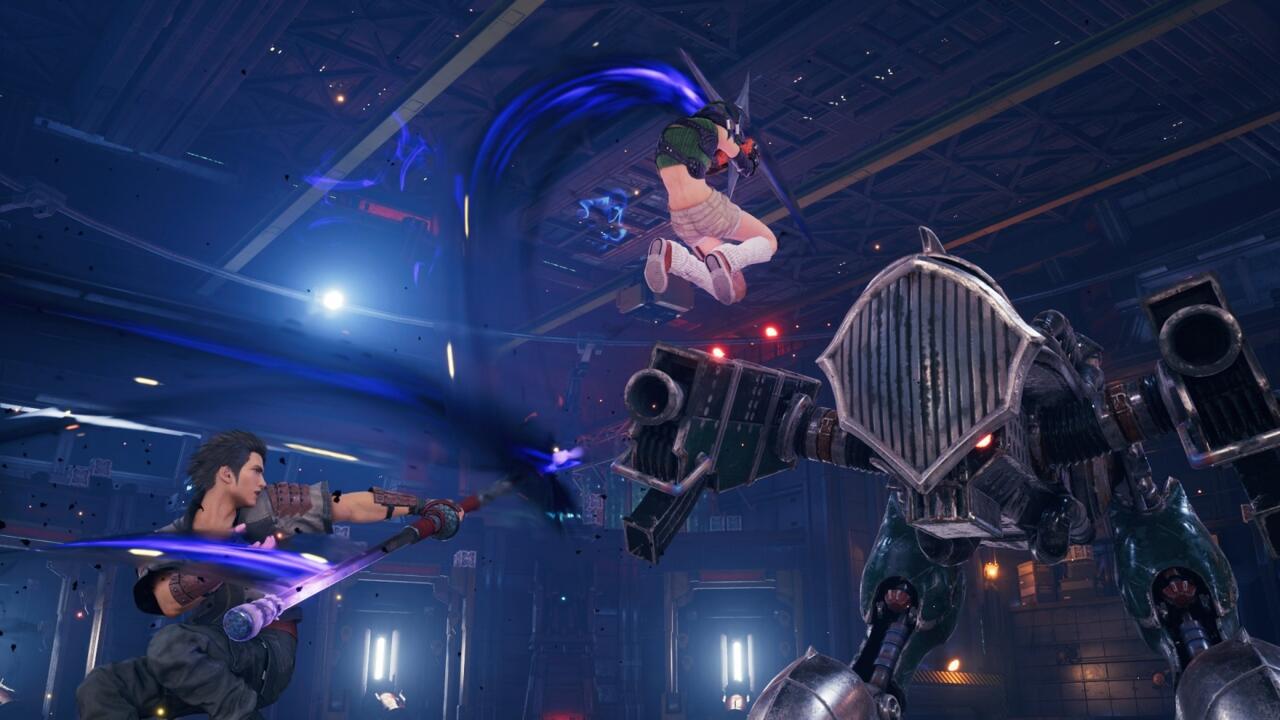The new episode in Final Fantasy 7 Remake has a few fun character beats, but ultimately feels like a thin, unnecessary stopgap for the next real installment.
By
Phil Hornshaw
on
Final Fantasy VII Remake’s tone often slides between light, funny moments and dark, tragic drama. But from the first moments of Intermission, the DLC mission added to the game with its Intergrade PlayStation 5 upgrade, it’s clear this new episode is mostly a comedy. In jumps Yuffie, one of the original game’s optional characters, and immediately her dangerous espionage mission to infiltrate the evil Shinra Corporation in Midgar is played like a kid goofing off. It’s a vibe that really works for the DLC, trading on the fact that Remake continues to be great about establishing fun, eccentric characters.
Taking place in the middle of Remake’s story, during the portion in which Cloud is separated from his compatriots, it follows Yuffie as she embarks on a mission to steal a secret Shinra weapon on behalf of her homeland, Wutai. Though the mission is dangerous, Yuffie approaches it with all the seriousness of a kid playing pretend–even though she’s on her way to first meet with Midgar’s Shinra resistance movement, Avalanche, and then sneak into the headquarters of a company that recently concluded a full-scale war with her home.
Now Playing: Final Fantasy VII Remake Intermission Video Review
The trouble with Intermission is that this side story doesn’t feel essential to anything going on. Sure, the DLC is providing context and backstory for a character that fans of the original Final Fantasy VII know will show up later in the story, but Yuffie’s mission is largely about her wandering around areas we’ve already seen, floating past but barely interacting with Remake’s cast, and taking part in minigames to waste some time. Yuffie’s a fun character to spend time with, even if you don’t have history with her from the first iteration of Final Fantasy VII, but it all comes off as a tease for something better down the road in FF7 Remake’s next installment. And after the remarkably deep and excellently realized version of the story that is Remake, Intermission feels like exactly that: a half-measure to fill time while we wait for the real show.
That’s not to say Intermission isn’t fun to play more often than not, though. When Yuffie is in combat, which is pretty damn often, she’s a blast to play. Like all the characters of Remake’s main cast, Yuffie has her own unique combat style that distinguishes her from how everyone else has played up to now. As a Wutai ninja, she packs a throwing star that’s good as both a close-range melee weapon and at long ranges. The options allow you to control the distance as you fight enemies–you can get in close to wail on them, bounce back to create a gap, then throw the star for distant damage that Yufife follows up with elementally charged “Ninjutsu” attacks that keep her out of harm’s way. Tap the Triangle button and you can retrieve your thrown star, not by drawing it back to you, but by sending Yuffie to it, allowing you to quickly close gaps and use enemies to maneuver around the battlefield.
Yuffie’s combat is all about controlling space and landing combos, and the string of melee attacks, star throws, and Ninjutsu allow you to absolutely lay into enemies for long barrages that can knock them off their feet and make them easy to dispatch. Once you get a rhythm down, there are times when it can be almost too easy to dismantle foes with all the options Yuffie has on-hand, especially as you add more weapons and materia to the mix. She’s a fast-paced fighter who can be devastating when you string her attacks together, and it’s a lot of fun to deftly mix all of her attacks together to dominate the battlefield.
Partway through the first chapter, Yuffie is joined by Sonon, her partner on the mission and a slightly older Wutai operative. In combat, Sonon acts as another means by which Yuffie can build out combos. You can’t control him, but you can trigger “synergy,” which has Yuffie and Sonon executing ability attacks for big damage and added effects. It’s a cool, if fairly simple, system that provides another tool for combat, while keeping the focus on Yuffie and her specific style.

Gallery










It’s in the dynamic between Yuffie and Sonon where we see shades of Remake, and Intermission at its best. Because Yuffie is technically the senior ninja despite her age, Sonon defers to her, while bouncing between exasperation for her overconfident, just-wing-it antics, and trying to give her a little helpful advice. For her part, Yuffie takes it all in stride. She knows how great a ninja she is, but she also never lets go of that air of excitedly performing “cool” for whoever happens to be looking in her direction. She’s a kid of incredible talent who’s still desperate to be taken seriously, while Sonon is a protective older brother type looking for a middle ground between annoying overbearance and risky overindulgence.
While the dynamic between Yuffie and Sonon is an interesting one, it doesn’t get tested or pushed much. That’s because the DLC neither covers an especially long time, nor puts the pair in especially impactful situations (you can wrap up the main story in four or five hours, longer if you decide to do some side content). The first chapter sees Yuffie and Sonon helping an Avalanche member avoid getting captured by Shinra by wandering through a sanitation plant in the undercity; the second has them running around the Shinra building. There aren’t any real twists or turns and there’s not much in the way of conflict except for the mission itself and the robots Shinra dispatches to try to stop you.
The same goes for what the story adds to the overall tale of Remake. Intermission plops you in the middle of Sector 7 during the tumultuous time before the story’s midpoint, but you mostly just get a few lines that flesh out the backstory of the squad of Remake. What’s more interesting are the bits in which Yuffie and Sonon have idle discussions about the political situation in Midgar and the rest of the world, as well as their ideological similarities and differences to Avalanche and its anti-Shinra operations.
Those little tidbits are where what Intermission adds to the story seems useful. It gives these little looks into both Yuffie’s character and the larger political landscape of Final Fantasy VII Remake, in a way that helps you understand the world a little better. But these small items are pretty few and far between, and while the character-building for Yuffie is nice, it’s not super clear why we’re revisiting this point in time or these places, or what revisiting them adds to the game overall.
There’s a big swing in this feeling right at the end of the DLC, where Intermission starts throwing deep-cut FF7 characters into the mix. It seems pretty clear that the idea here is to bring the wider FF7 universe, fleshed out in spin-offs like Crisis Core and Dirge of Cerberus into the main storyline, but the DLC doesn’t provide any context for what’s going on or, crucially, who these people are. Again, it plays into the idea that Intermission feels like a tease for where things are going later on, when we’re likely to get a more complete look at some of these elements. For now, it mostly adds confusion, especially if you’re not overly familiar with all that extra FF7 lore, and makes for some less than satisfying moments as the DLC wraps up.

Gallery







Apart from the main story, Intermission also adds some side content to keep you busy, but it mostly seems to exist to pad the runtime. There are a few new combat challenges and minigames, like Whack-A-Box (in which you break boxes by hitting them, earning points before a timer runs out) and Fort Condor, a sort of light strategy game. Fort Condor is the big new item in Intermission, mixing the spirit of chess with the creature summoning of Magic: The Gathering, in the broadest sense. You get a series of characters you can place on the board, who then march toward your opponent’s side and try to destroy their three forts. Your opponent can also drop characters, and who wins a fight depends on a rock-paper-scissors system that determines which types of characters get the upper hand. Its simplicity makes it very easy to pick up and play.
Fort Condor can be fun, especially as you add new pieces and boards to your repertoire, which give you a variety of options for your attacks and defenses, and the ability to use some magic spells during a match. But it’s all pretty simplistic, ultimately. You don’t control the character, you just choose where to put them, and the strategy is all about what pieces you use and when. Boards that let you get pieces out faster and in greater numbers tend to win, and there’s just not a lot of brainy options or strategic thinking that can help you to win out if you happen to have the wrong set of pieces of a particular matchup. With only a handful of matches to play during your first run through the story, it also won’t keep you busy for very long.
Altogether, Fort Condor, the story of Intermission, and all the other content in the DLC suffer from the same problem: They feel exceedingly thin. Not that an add-on chapter to a game needs to be especially enormous, but Intermission is a DLC that mostly takes place in one of the hub areas of FF7 Remake, and yet lacks meaningful character interactions or side quests to flesh out its world. Hanging out with Yuffie and Sonon is fun, but while you have run-ins with a number of important characters in key moments, the whole thing brings little to your understanding of the story of Remake as a whole.
In the end, Intermission is a pit stop, a quick jaunt into the gas station minimart of Final Fantasy VII to refuel, grab a snack, and get ready to wait some more. With its fun combat and quirky character moments, it’ll likely remind you of what you like about FF7 Remake–but it won’t be enough to hold you over.
Back To Top

